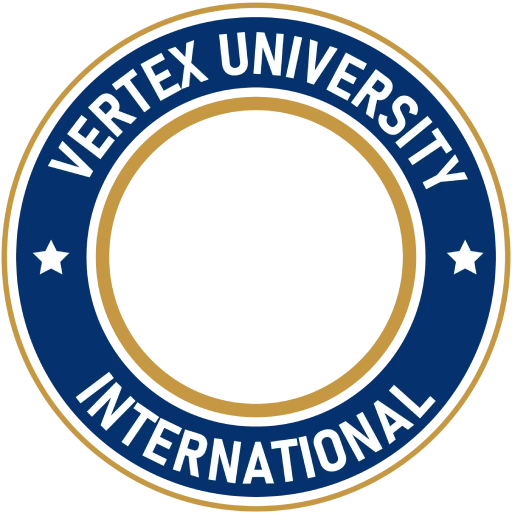Master MHA-H Hospital Administration
Hospital management has become a key element in improving the quality of health services and ensuring the efficient operation of medical facilities. With the increasing complexity of healthcare systems, the demand for hospital management specialists is greater than ever, requiring advanced leadership skills, the ability to improve operational performance, and effectively manage human and financial resources. In this context, the Master of Hospital Management program at the Faculty of Health and Environmental Sciences at Vertex University offers an integrated academic approach aimed at developing cadres capable of leading hospitals and health facilities in accordance with the latest international standards, with a focus on innovation and digital transformation in the health care sector.
The curriculum focuses on providing an integrated understanding of the areas of hospital management. Students acquire the skills needed to develop advanced operational strategies, analyze the quality of medical services, and manage financial and human resources efficiently. The program also provides advanced training on the use of digital systems in hospital management, as well as the analysis of medical data to support planning and decision-making based on accurate information. The program aims to qualify administrative leaders who are able to deal with administrative complexities within health facilities, while adopting innovation and modern technologies to ensure compliance with international standards.
The program enhances the practical aspect by providing practical training opportunities and advanced case studies that enable students to develop their skills in areas such as improving operating efficiency in hospitals, implementing quality standards and patient safety, and employing specialized software in health management. Emphasis is also placed on understanding local and international health laws and regulations to ensure that graduates are able to work in environments that require strict adherence to health regulations and policies, thus enhancing their readiness to meet professional challenges.
The courses are taught by an academic team with extensive experience in hospital management, ensuring the provision of advanced educational content that combines theoretical knowledge and practical applications. The modern learning environment provides interactive laboratories, advanced simulation systems for health management, and applied research projects aimed at developing innovative solutions in the management of medical facilities. Students also have the opportunity to obtain internationally recognized training certificates in specialized fields, which enhances their employment opportunities and opens wide doors for them in the labor market.
The program offers graduates various career opportunities in the health sector, where they can assume leadership positions in the management of hospitals and medical centers, develop health operation strategies, quality management and patient safety. They can also work in health insurance companies, medical consulting companies, or even establish their own businesses in developing specialized management solutions for hospitals. Thanks to this combination of academic and applied skills, graduates are qualified to play a pivotal role in improving the efficiency and sustainability of hospitals in various health sectors.
Our Vision and Mission
Towards a global leadership in qualifying leaders who are able to improve hospital operation and achieve excellence and sustainability in the management of health institutions.
Our Vision
The Master of Hospital Administration program at Vertex University should be a pioneer in preparing health leaders who are able to improve the operation of medical institutions and enhance their efficiency and sustainability in accordance with the latest international standards.
Our Mission
Qualifying hospital management specialists with advanced strategic skills who are able to integrate health management with modern technologies to improve the quality of medical services and enhance the sustainability of health systems.
- Develop leadership skills to manage hospitals efficiently and achieve the highest levels of operational performance.
- Improve the quality of health services through the application of quality and patient safety standards.
- Enhancing the efficiency of financial and human resources management to ensure the sustainable and effective operation of hospitals.
- Understand health laws and regulations to ensure compliance with local and international standards in hospital management.
- Develop innovative operational strategies to increase the efficiency of administrative processes within hospitals.
- Using digital technology and artificial intelligence to improve hospital management and analyze health data.
- Managing operational and medical risks to ensure patient safety and reduce medical and administrative errors.
- Enhance strategic planning skills to develop hospitals and achieve sustainable expansion.
- Analyze and evaluate health performance using statistical tools and advanced medical data systems.
- Develop negotiation and crisis management skills to ensure the continuity of efficient delivery of health services.
- Promoting a culture of innovation and organizational change in hospitals to keep pace with developments in the health sector.
- Develop evidence-based decision-making skills to improve the quality of health care and cost management.
- Improve patient experience by developing policies aimed at raising the level of medical and administrative service.
- Enhancing cooperation between medical and administrative departments to ensure integrated and effective operation within the hospital.
- Preparing qualified staff to occupy leadership positions in hospitals, health centers, and medical management companies.
Teaching methods and strategy

case studies
The Master of Hospital Management program from Vertex University integrates an applied case study approach, where students gain practical experience in analyzing operational and administrative problems facing hospitals. Emphasis is placed on evaluating the efficiency of hospital workflow, improving patient experience, and analyzing medical and administrative resource management strategies. This approach helps develop students' skills in making data-driven decisions, enabling them to propose effective solutions to problems such as managing hospital capacity, reducing waiting times, and enhancing coordination between medical and administrative departments.

Scientific projects
The program pays great attention to applied research projects. Students are assigned to study and analyze hospital operations, evaluate financial and administrative performance, and develop strategies to improve operational efficiency. Projects include designing innovative solutions such as improving patient record management, developing systems for monitoring the performance of medical teams, and developing effective operational plans for vital departments such as emergency and intensive care. The focus is also on managing operational risks, developing sustainable models for hospital financing, and studying the impact of modern technology on improving administrative performance and health services.

Teaching strategies
The Master of Hospital Administration program from Vertex University is based on interactive teaching methods that integrate theoretical education and practical training, providing students with an integrated learning experience. Academic content is delivered through interactive lectures that focus on the latest trends in hospital management, and analyzing real operational data to understand decision-making mechanisms within health institutions. The program also includes workshops on the application of quality standards and a digital simulation of health management that allows students to experience realistic scenarios about managing health facilities and making operational decisions.
What can you do with a Master's degree in Hospital Management?
The Master of Hospital Administration qualifies its graduates to assume leadership and administrative positions in hospitals, health centers, and health insurance companies, with a focus on developing planning and management skills to improve the quality of services, enhance operational efficiency, and ensure adherence to international health standards.
Lead digital transformation in medical record management and smart health information systems.
- Hospital director
- Director of Health Operations
- Director of Health Care Quality
- Director of Human Resources in Hospitals
- Director of Finance and Health Planning
Provide innovative solutions to improve the efficiency of hospitals and improve the quality of health services.
- Director of Health Information Systems
- Hospital Management Consultant
- Director of Health Insurance
- Director of Supply and Health Supply Chains
- Director of Health Development and Strategies
Get a consultation
Free now
Do you want to help?
+1 (984) 382-6080
Target group for the Master of Hospital Management Program

The Master of Hospital Administration program aims to qualify students with the leadership and management skills necessary to enhance the efficiency of hospital operation, improve the quality of medical services, and develop sustainable operating strategies. This program is an ideal choice for the following ambitious categories:
- The Master of Hospital Administration program targets graduates of medicine, pharmacy, nursing, and applied medical sciences who seek to develop their skills in hospital management, analyze operational systems, and apply quality standards in health institutions.
- The program provides a unique opportunity for specialists working in hospitals, clinics, medical centers, and health insurance companies to develop their knowledge in the management and operation of health facilities, improve the quality of medical services, and analyze operational performance. Individuals
- The Master of Hospital Administration from Vertex University is an ideal opportunity for people looking to switch from other disciplines to the field of health administration. By studying hospital administration, strategic planning, and health governance, students can build specialized experience that will enable them to enter the hospital sector with a strong management background.
- The program targets entrepreneurs and owners of emerging companies in the field of health services who seek to manage and operate hospitals or private medical centers efficiently and sustainably. The master's degree provides participants with in-depth knowledge of hospital financial management, developing operating strategies, and improving quality and health safety, helping them design innovative management solutions and successfully manage their projects.
Enhance your professional skills with international certifications
This certificate is one of the specialized certificates in the management of health facilities. It focuses on developing hospital infrastructure management skills, including operation and maintenance, environmental risk management, and improving the efficiency of medical facilities in accordance with international standards.
Awarded by the American College of Health Care Executives (ACHE), it aims to qualify hospital executives with leadership skills, strategic planning, and operational management in major health institutions.
This certification focuses on enhancing quality management and patient safety skills. It includes standards for improving clinical performance, analyzing operational data, and implementing quality improvement strategies in hospitals and health centers.
This certification is essential for hospital management professionals. It focuses on analyzing operational and clinical risks, developing risk management strategies to ensure patient safety and reduce medical and administrative errors.
This certification is granted to specialists in the management of medical data and records in hospitals. It qualifies them to manage health information systems, analyze clinical data, and ensure compliance with health laws related to the protection of patient privacy.
This certification focuses on managing digital systems in hospitals, including e-health technologies, automating administrative processes, and analyzing big data to improve the efficiency of the operation of health institutions.
Admission Requirements
- Regular admission: the student applying for the graduate program must have a bachelor's degree from a reputable university or from the student's country.
- The applicant has obtained a bachelor's degree in medicine, pharmacy, nursing, or any related specialty from an accredited university.
- English language proficiency if the language of instruction in the program is English, with passing the approved language test.
- Conditional admission: The university may offer conditional admission to applicants until all admission requirements are met (terms and conditions for this category apply).
- Submit official documents including the original Bachelor's degree and transcript, along with true copies.
- Fill out the electronic application form through the admission and registration portal at the university.
- Pay the registration fees and tuition fees prescribed in accordance with the university regulations.
- Comply with the university's rules and regulations by signing an official pledge.
Required Documents
- A colored copy of the bachelor's degree issued by the student's country “Ministry of Higher Education”.
- A colored copy of the student's or family ID for matching.
- A colored copy of the student's passport.
- Personal photo (6*4) with a white background.
- Complete the registration data and sign it by the student.
Requirements for Obtaining Master in MHA-H Hospital Administration Specialization
| Number of Credit Hours Required to Complete the Master Degree | 33 Minimum Required Credit Hours |
|---|---|
| Number of Required Academic Semesters | 4 Academic Semesters |
| Number of Semesters per Year | 3 Semesters |
| Annual Credit Hours | 45 Credit Hour |
| Semester Duration | 8 to 10 weeks |
| Expected Duration to Complete the Program | 1 year and 18 months |
Advantages of this system.
- Complete the master's degree in a short time: the program can be completed in one and a half years instead of two or three years.
- Flexible distribution of materials: materials are distributed throughout the year, allowing continuous learning without long interruptions.
- An intensive schedule: allows you to finish school quickly and is suitable for students who want to enter the labor market as soon as possible.
*This system was designed at Vertex University to enable students to obtain their university degree in a shorter time while maintaining the quality of education and the efficiency of the academic process.

Want to get more information?
Register your details and we will contact you as soon as possible
Frequently Asked Questions about Master MHA-H Hospital Administration
An integrated blend of theory and practice, with realistic projects, health data analysis, and virtual or field training.
The college seeks to obtain CAHME and APHEA accreditation. The curricula are designed according to academic and professional quality standards.
Prior experience is preferred, especially in healthcare administration, but is not a mandatory requirement.
Yes, students can choose a flexible system that fits their practical obligations.
Yes, classes can be temporarily postponed or suspended according to university policy.
Leadership positions in hospitals, health organizations, the government sector, or academic and research work.
